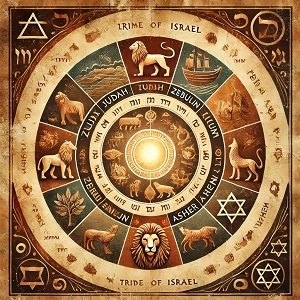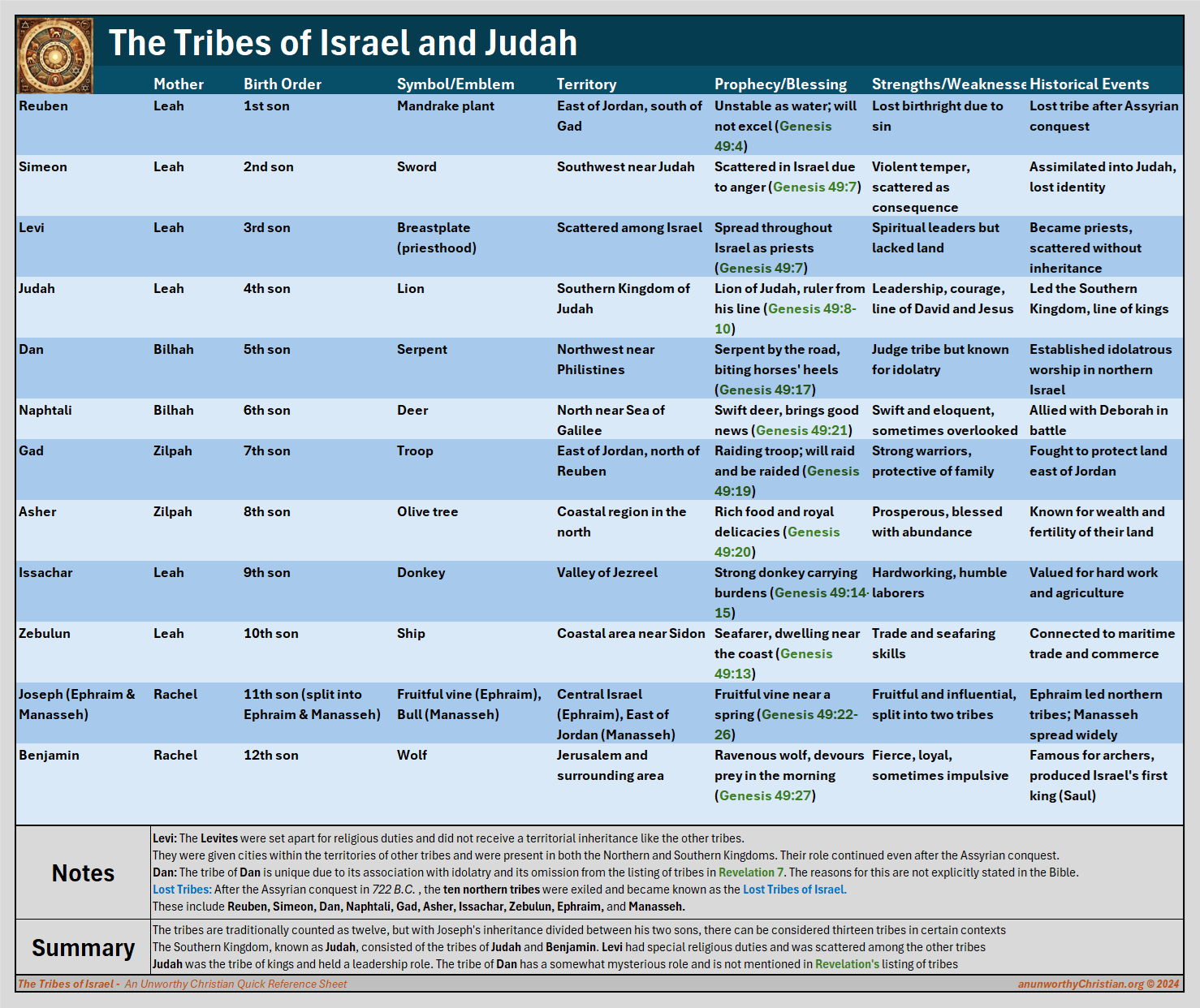
The Tribes of Israel
The Tribes of Israel are traditionally understood as the descendants of the twelve sons of Jacob, who was also called Israel. These tribes form the basis of the nation of Israel in the Bible. Below is a summary of the key details about the tribes, their origins, special duties, leadership, and the concept of the "lost tribes."
Origin of the Tribes
Jacob (Israel) had twelve sons by his two wives, Leah and Rachel, and their maidservants, Bilhah and Zilpah. These sons became the progenitors of the Twelve Tribes of Israel:
1. Reuben - Firstborn of Jacob by Leah. 2. Simeon - Second son of Jacob by Leah. 3. Levi - Third son of Jacob by Leah, whose descendants became the priestly tribe. 4. Judah - Fourth son of Jacob by Leah, from whom the Davidic line and Jesus Christ descended. 5. Dan - First son of Jacob by Bilhah, Rachel's maidservant. 6. Naphtali - Second son of Jacob by Bilhah. 7. Gad - First son of Jacob by Zilpah, Leah's maidservant. 8. Asher - Second son of Jacob by Zilpah. 9. Issachar - Fifth son of Jacob by Leah. 10. Zebulun - Sixth son of Jacob by Leah. 11. Joseph - First son of Jacob by Rachel. His two sons, Ephraim and Manasseh, each became a tribe, thus splitting Joseph's inheritance into two. 12. Benjamin - Second son of Jacob by Rachel.
Twelve or Ten Tribes?
The traditional count of the tribes is twelve , but since Joseph's inheritance was divided between his two sons, Ephraim and Manasseh , there are effectively thirteen tribal territories (excluding Levi, which did not receive land).
In some contexts, only ten tribes are mentioned, particularly when referring to the Northern Kingdom of Israel after the split following King Solomon’s reign. The Southern Kingdom, Judah, consisted of the tribes of Judah and Benjamin .
The Lost Tribes of Israel
After the Assyrian conquest of the Northern Kingdom in 722 B.C. , ten tribes were deported and lost to history, becoming known as the "Lost Tribes of Israel." These tribes are Reuben, Simeon, Levi (though the Levites were scattered), Issachar, Zebulun, Dan, Naphtali, Gad, Asher, Ephraim, and Manasseh.
The tribes of Judah and Benjamin remained in the Southern Kingdom, which eventually became known as the Kingdom of Judah.
Special Duties of Tribes
Levi: The Levites were set apart for religious duties. They served as priests and took care of the Tabernacle (later the Temple in Jerusalem). They did not receive a territorial inheritance like the other tribes, but were given cities within the territories of the other tribes.
Judah: Judah is significant because it was the tribe of kings, including King David and ultimately Jesus Christ. The tribe of Judah was also the dominant tribe in the Southern Kingdom.
Leadership and Roles
Reuben: As the firstborn, Reuben initially had a position of leadership, but he lost his birthright due to misconduct ( Genesis 35:22 ).
Judah: Judah took on a leadership role among his brothers, particularly in the narrative of Joseph ( Genesis 44:18-34 ). Judah’s descendants included the kings of Israel, culminating in Jesus.
Joseph: Though Joseph himself did not lead a tribe, his sons Ephraim and Manasseh became prominent, with Ephraim often taking a leading role among the Northern tribes.
Dan: The tribe of Dan had an ambiguous role in biblical history. Initially settled in the south, they later moved to the north. The tribe of Dan is not mentioned in the listing of tribes in Revelation 7 , leading to various theories about their fate.
What Happened to Dan?
The tribe of Dan is unique in that it is often associated with idolatry ( Judges 18 ) and later migrated to the northern part of Israel. Some speculate that Dan’s exclusion from the list in Revelation ( Revelation 7:4-8 ) could be linked to its association with idolatry or some form of apostasy, though the Bible does not explicitly state the reason.
Summary
There are twelve tribes traditionally, but with the division of Joseph’s sons, there can be considered thirteen in certain contexts. The lost tribes refer to the ten northern tribes exiled by Assyria.
Levi had special religious duties, Judah was the tribe of kings, and the tribe of Dan has a somewhat mysterious and ambiguous role. The leadership of each tribe was often familial, with the descendants of the tribe's namesake leading it, though the Bible does not always specify a single leader for each tribe.
The below overview captures the essential details about the Tribes of Israel and their significance in biblical history. Click it to view it full size.
